Vocational Training
Employment and Entrepreneurship Training
“Helping Women Help Themselves”
CCTF firmly believes in empowering women by giving them practical skills and a vision for life. The Employment and Entrepreneurship Training project has already helped 416,000 young women so far.
Background of project:
Women in impoverished rural areas and migrant women, who have left their local communities to seek employment in the cities, form the majority of those facing severe hardship. Many live in squalid conditions since they are without income or working in low paying ‘sweat’ occupations; some turn to prostitution in their desperation to escape poverty. Helping these women to help themselves and their dependents, by providing skill-training to improve access to the labor market and the opportunity in some cases to establish small enterprises, can ameliorate these problems. The role of women as the mainstay of many households in supporting family incomes and in nurturing children is critical and support for women to help themselves become economically active is vital for community stability.
Training provided:
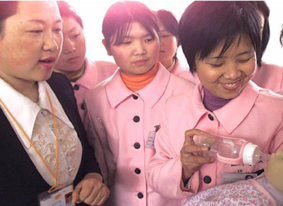
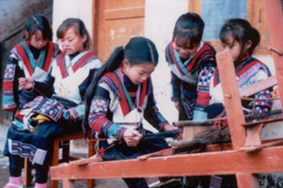
The employment and entrepreneurship training project has provided training opportunities and a variety of support mechanisms to enable women in both rural and urban areas to work towards profitable employment. The diverse interests and various abilities of local women have been taken into account and training for multiple occupations is available. Courses are offered which focus on agricultural techniques, weaving, child care, and hair styling. The training lasts 45 days culminating in an examination upon completion. For one woman to complete the training it costs approximately $220 USD.
The Training Program for Teachers in Rural Area
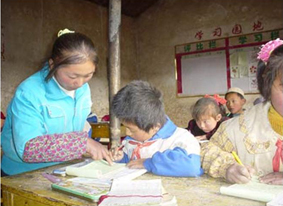
Introduction:
On Nov. 13, 2006, editors of China Teacher News received a special petition from students and their parents in Zhongzhuang, a impoverished rural village in Gansu Province. In the petition students said, “Students in mountainous areas should enjoy an equal opportunity to obtain an education as those in urban areas. Not only are we aspiring for more knowledge, but we expect there to be adequate teachers in our schools. For no reason, three of our formal teachers have been transferred to other places since the beginning of this semester, which culminated in the suspension of our English lessons. We sincerely hope that leaders at all levels could deal with this problem…”
Background Information:
The number of children in rural areas of China has grown to about 1,600,000,000, including 20,000,000 “left-behind” ones whose parents seek employment in the big cities. According to the latest statistics, the total number of rural teachers is around 8,000,000. Students in rural areas can hardly enjoy sound opportunities to study new information given the unsatisfactory qualifications of their teachers and the myriad of external limits such as the lack of new teaching mediums and the poor wages offered to teachers in these poorer districts. Central to this thorny problem is the concern about how to re-allocate educational resources in a more reasonable and effective way within the existing confines and to improve the overall quality of education in rural areas. In this broad context CCTF’S training program for teachers in rural areas could play a significant role in solving this urgent problem by both enhancing the quality of these teachers and mitigating the unfavorable external limits placed upon them.
Problems of the teachers in Chinese rural areas and their impact on educational quality:
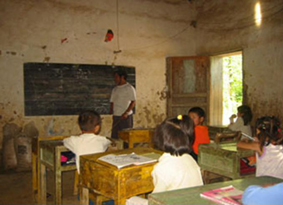
- severe shortage of formal teachers with the phenomena of unqualified substitutes prevalent.
- the inadequate professional knowledge of rural teachers, characterized by an overwhelming concentration on Chinese and mathematics with little or no emphasis on other important subjects such as arts and sciences.
- the low level of overall teacher quality, which manifests itself mainly in their limited methods of instruction and close-mindedness.
- instability of the teaching staff, with better educated teachers often leaving rural areas for higher paying jobs in larger cities.
- unreasonableness of age structure. Simply put, there are too many old teachers.
Objectives:
- help teachers in poor rural areas understand the importance of their work and kindle enthusiasm for this work through psychological guidance.
- perfect the knowledge structure and enhance the professional educational skills of these teachers through effective, individually tailored training.
- improve the interactive skills of teachers towards children and help them develop in a multi-dimensional way through professional training about children’s psychology.
- improve education in poor rural areas and strive for more resources in order to bring rural education on par with urban education.
Electric Worker Training
Introduction
This training aims to help youth acquire more technological training within electronic industry sectors. Many migrant youths do not have basic vocational skills and so cannot find a suitable job. This training gives them these basic techniques and the opportunity to secure a new job.
On February 27, 2008, the first training class of 200 migrant youths started on the Qinghe and Yanqing Campuses. All of the trainees were migrant youths who were not previously involved with electronic industry. They have now reached the intern stage, and are about to go through examinations for certification.
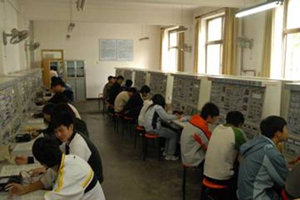
Studying hard in the electric room
Housekeeper Training
Background
l There is an urgent need for housekeepers in today's world, particularly in a nation that is growing as fast as China.
l People in the labor market often do not have enough skills to work as fully as they could. Such training as provided in this program not only makes one more employable but demands higher pay as well.
Advantages of this Program
l Provides free training
l Housekeeping positions often come with a free room and food.
Training Process
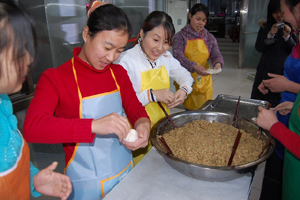
A cook is teaching trainees how to make dumplings.

Professional cooks are teaching trainees various cooking methods.
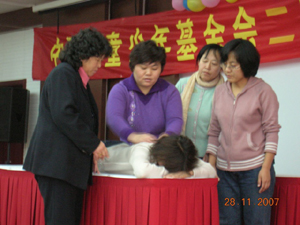
Trainers teach future housekeepers how to serve their employer families in many ways, including massage.
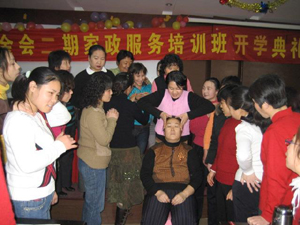
Teachers show trainees nursing methods.
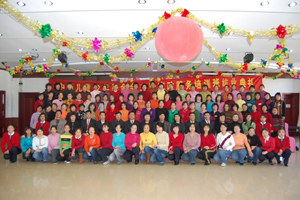
The Trainees have a photo session with the leader of theTrainingCenter.
Xu Jinju's Story
Born into a poor family, Xu Jinju, a young woman of Li County, Gansu Province came toBeijingin the hopes of finding a job. She has been working in Beijing Ainong Housekeeping Company as a housekeeper since 2006, during which time she has been consciously aware of her limited education, particularly of the professional knowledge related to her job. Her lack of skills has hindered her career growth, despite her having received praise from employers for her hard work.
On November 25, 2007, Xu Jinju fortunately participated in the free housekeeping training program held by CCTF, gaining essential vocational skills and indispensable information. During the ten-day training course, she received comprehensive instructions in such areas as 1) comity and ethnicity, 2) high-level cooking, 3) healthcare for bedridden women including postnatal recovery, arrangements for nutritious meals, psychological guidance, etc., 4) nursing for infants consisting of daily care, feeding, potential diagnosis and treatment for common conditions, and 5) family sanitation.
This training has helped Xu Jinju to become a much more affective housekeeper, giving her a better sense of job security, better wages, and more self confidence.
Ji Mingyan's Story
Ji Mingyan came from a remote township of the Northeast. At present, she is a housekeeper for Beijing Tianzhitianli House Keeping Company.
Her family was very poor, having to support a sickly older generation, a schoolchild,

and a very ill husband with a chronic disease. In order to feed her family members, she came toBeijingto work. Because she did not receive formal training, however, she could only do ordinary housekeeping. She was eventually forced to quit the job.
Fortunately, she was chosen to take part in the first housekeeper training class held by the Safe and Healthy Growth Training Center of China Children and Teenagers'Fund at no charge, including free food and boarding. Through the training, she mastered the knowledge and skills necessary for better employment in the housekeeping field.
In 2007, she was awarded as an outstanding housekeeper by her company. Her salary was raised to 2,500 RMB. The technical training she received from CCTF's Housekeeper Training Program has changed her fate and improved the standard of living of her family.